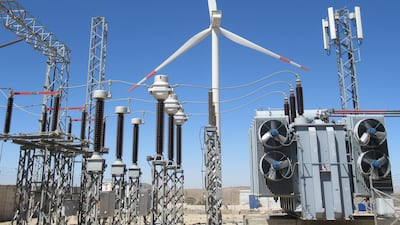The Arab Petroleum Investments Corporation (Apicorp) plans to allocate $1 billion to fund green energy projects, as it seeks to prioritise sustainable investments in compliance with its new environmental, social and governance policy.
The multilateral lender, which is owned by the 10 members of the Organisation of Arab Petroleum Exporting Countries, will measure the ESG footprint of all of its assets by the end of 2023.
The Dammam bank's green assets currently account for $500 million in loans and direct investments, equivalent of 13 per cent of its portfolio.
"We want to support a transition to a low-carbon, climate-resilient economy by mitigating risks across our operations, supply chain and client transactions by embedding sustainable principles in our business practices," Aabed Al Saadoun, the chairman of the board of directors at Apircorp, said.
"We embark on this journey with the reassurance that all of our member countries are signatories to the 2015 Paris Agreement and participants at Cop26 to be held in Glasgow later this year."
Global multilateral investment banks are increasingly funding green technology, renewables and sustainable solutions and are reducing the weightage of more polluting fuels such as coal in their portfolios.
Higher ESG compliance among banks comes as investors become more conscious about the environment after the Covid-19 pandemic caused a decline in emissions. A growing commitment towards ESG principles among stakeholders is also behind banks dumping polluting assets and switching to those with cleaner footprints.
Developed countries are also being urged to help bridge the gap in financing for developing economies by international financial organisations such as the International Monetary Fund.
The Washington-based institution has been urging developed nations to spend $100bn on an annual basis on climate finance.
Apicorp's newly-unveiled ESG toolkit will classify portfolio companies on the basis of high, medium and low risk.
High-risk entities are those "with significant adverse ESG impacts which are sensitive, diverse or unprecedented", the bank's report noted.
Medium risk entities have "specific ESG impacts that are few in number, generally site-specific, largely reversible and readily addressed through mitigation measures and international best practice".
Lastly, low risk businesses are those "which typically involve activities with minimal or no adverse ESG impacts", the bank said in its assessment.
"As a multilateral development bank with exposure to myriad industries within the energy space, we have the added advantage of being able to measure the overall impact more accurately across the regions in which we operate," said Ahmed Attiga, chief executive of Apicorp.
"Equally important, we will continue to drive the ESG agenda in our member countries through our research and knowledge sharing activities, as well as our unique position in advising key policymakers within government and regulatory circles," he added.
Earlier this year, the bank pledged to support clients in the energy sector with disbursements of up to $2bn to tide them over during the Covid-19 pandemic.


